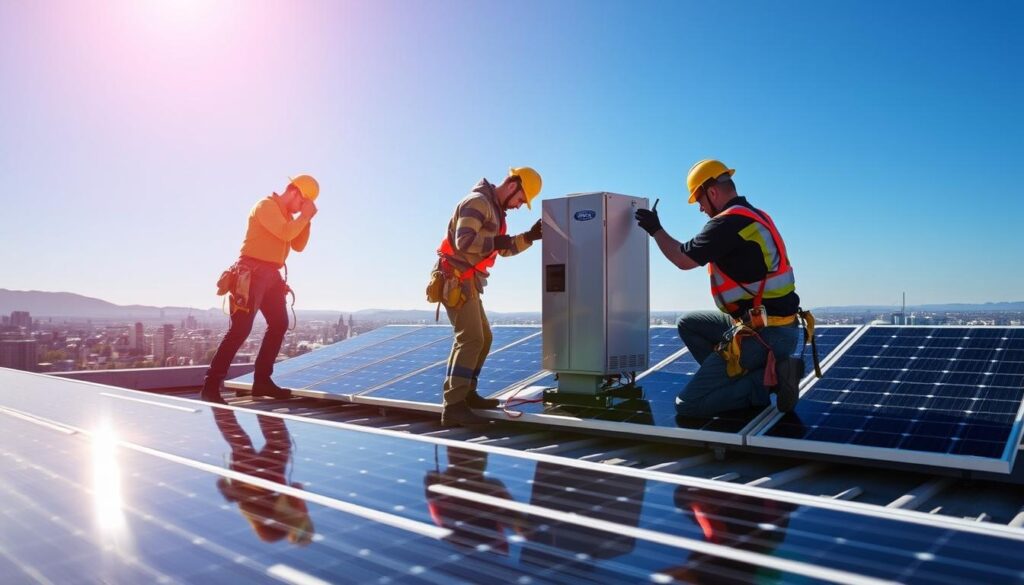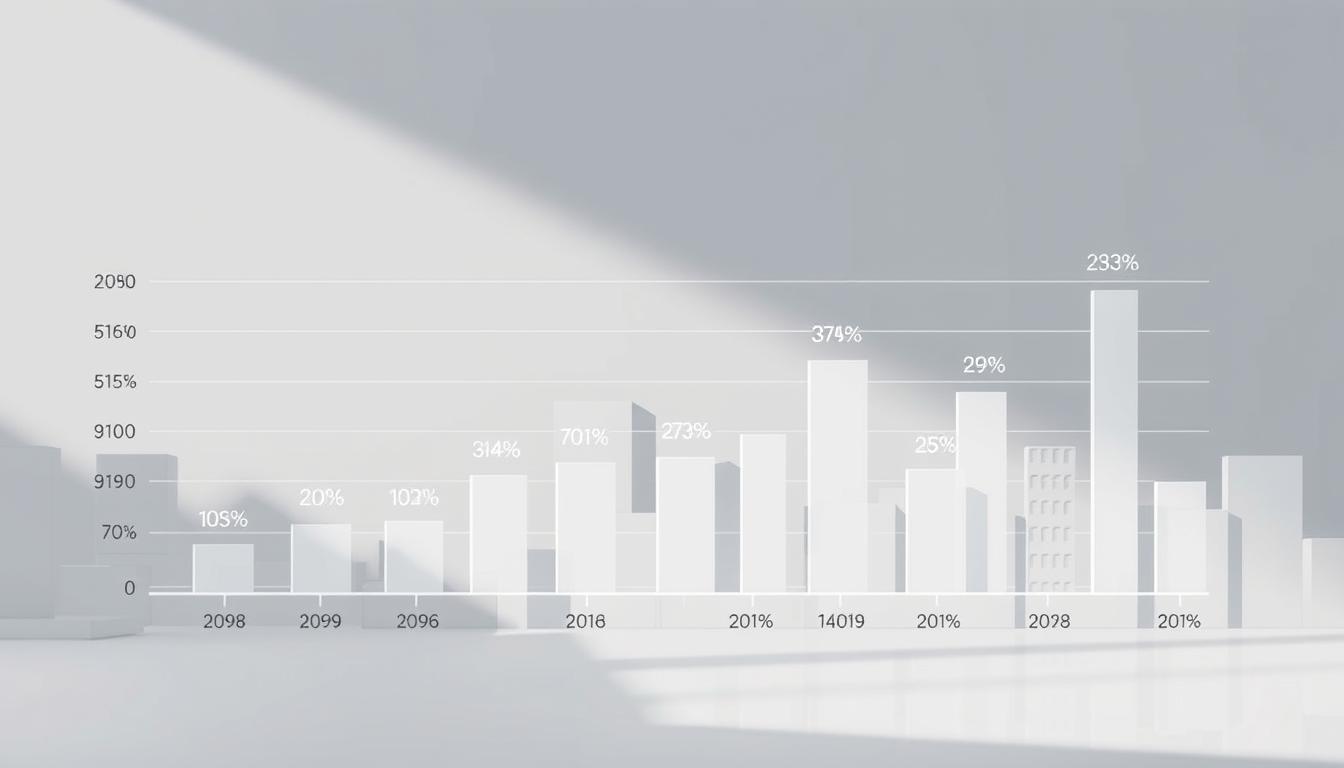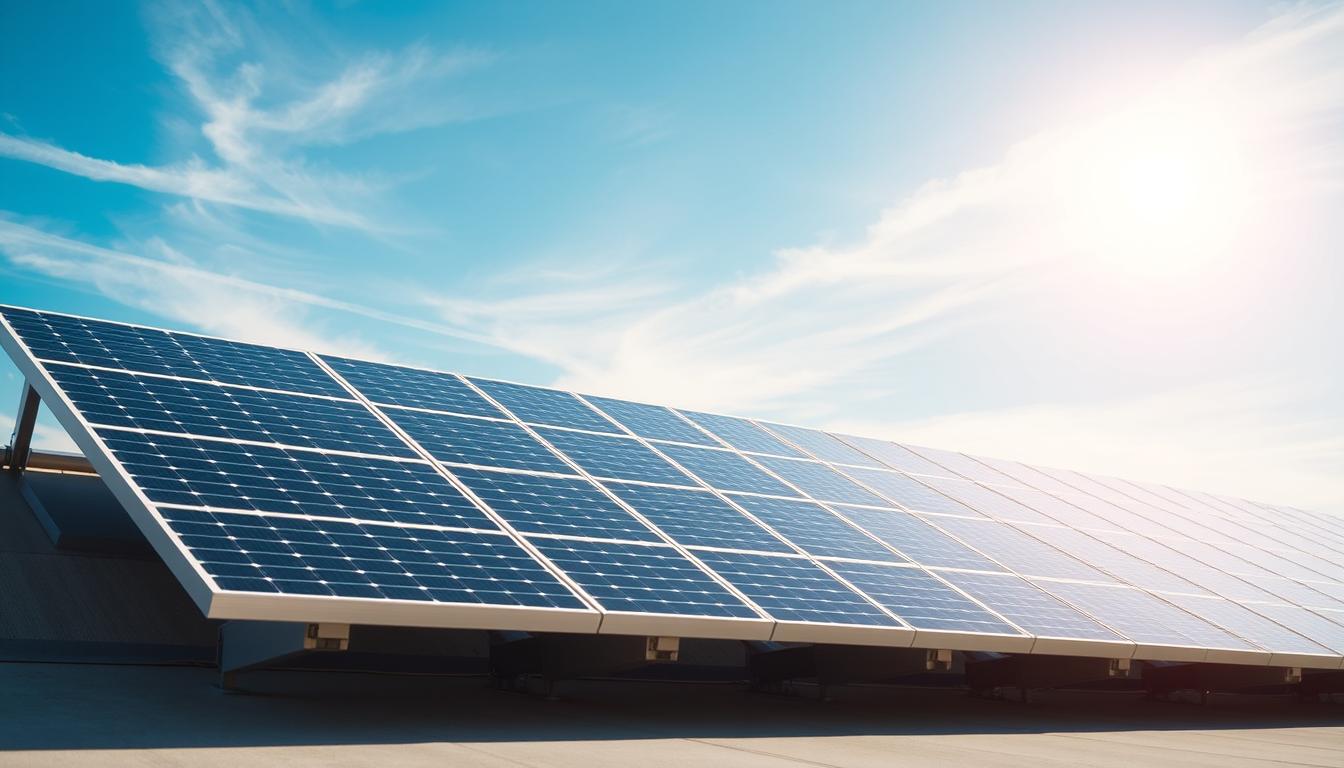Switching to renewable energy is a big step. Finding the right solar panel installation service is key. SolarReviews says you need the best equipment, a reliable installer, and a good price.
Choosing a solar company can be tough. But, expert advice can help. Look at the company’s experience, what customers say, and the quality of their work.
By paying attention to these details, you can choose wisely. This ensures your energy needs are met and you stay within budget. Expert tips can help you find solar companies near you that offer great value.
Key Takeaways
- Evaluate a solar company’s experience and reputation.
- Consider the quality of their solar panel installations.
- Look for competitive pricing and financing options.
- Check customer reviews and testimonials.
- Ensure they offer complete warranties and support.
Understanding Solar Energy Basics
For homeowners thinking about solar panels, learning the basics is key. Solar energy is a good alternative to traditional energy. It offers many benefits to those who choose it.
How Solar Energy Works
Solar energy turns sunlight into electricity with photovoltaic (PV) panels or solar panels. These panels use semiconducting materials. When sunlight hits them, they release electrons, creating electricity.
Key Components of Solar Energy Systems:
- Solar Panels: Convert sunlight into electricity.
- Inverter: Converts DC power from the panels into AC power usable in homes.
- Mounting System: Secures the solar panels to your roof or ground.
- Battery Storage (Optional): Stores excess energy for later use.
Benefits of Solar Power for Homes
Solar power has many benefits for homeowners. It can lower your electricity bills and increase your home’s value. It also helps reduce your carbon footprint.
| Benefit | Description |
|---|---|
| Reduced Electricity Bills | Lower your energy expenses by generating your own electricity. |
| Increased Property Value | Solar panels can boost your home’s value and appeal. |
| Lower Carbon Footprint | Contribute to a cleaner environment by using renewable energy. |
Common Misconceptions About Solar Energy
Despite its growing popularity, many people have misconceptions about solar energy. Some think it’s too expensive or only works in sunny places. But, technology has improved, making solar panels more affordable and efficient. They can work even on cloudy days.
“Going solar is a major home improvement that most people do once in a lifetime,” as noted on solar.com. This shows why it’s important to understand the basics before deciding.
Why Choose Local Solar Companies?
Choosing local solar companies offers many benefits. You get community support and better service. It’s more than just getting a service; it’s investing in your community’s future.
Community Support and Involvement
Local solar companies are big supporters of their communities. They help out at local events, support causes, and boost the local economy. By picking a local company, you help local jobs and projects.
According to SolarReviews, “local, family-owned solar companies record far higher levels of client satisfaction.” This focus on the community can greatly improve your experience.
“Local solar companies are the backbone of our community’s renewable energy movement.”
Knowledge of Local Regulations
Local solar companies know all about local rules, permits, and incentives. This knowledge makes installing solar panels easier and ensures everything is done right. They also know about tax credits and rebates, helping you save more.
| Benefit | Local Solar Companies | National Solar Companies |
|---|---|---|
| Knowledge of Local Regulations | Expert understanding of local laws and incentives | Limited knowledge, may require local partners |
| Community Involvement | Highly involved, supports local causes | Limited community engagement |
| Service Proximity | Quick response times due to proximity | May have longer response times |
Proximity for Better Service
Choosing a local solar company means better and faster service. They can quickly fix any problems or maintenance needs. This keeps your solar system running smoothly.
By picking a local solar company, you’re not just getting solar panels. You’re investing in a partnership that helps you and your community. With their local knowledge, community support, and quick service, local solar companies offer a top-notch solar experience.
Factors to Consider When Selecting a Solar Company
Choosing the right solar company is key to saving money and having a good experience. It’s important to look at several factors when picking a solar provider.
Licensing and Certifications
According to solar.com, “the most important thing to look for when searching for solar providers in your area is whether or not they have the proper licenses and certifications.” A licensed and certified solar company ensures your installation is done right and safely. Look for certifications from organizations like the North American Board of Certified Energy Practitioners (NABCEP).
Customer Reviews and Testimonials
Customer reviews and testimonials are very helpful. They show if a company is reliable and cares about its customers. You can find these on the company’s website, Google, and social media.
When looking at reviews, notice the number of them and how satisfied people are. This helps you choose the best solar companies for you.
Financial Stability and Guarantees
A solar company’s financial health is very important. A stable company will support you and your investment for a long time. Look for companies that guarantee their equipment and services.
Ask about their financial history, financing options, and warranties. A good company will be open about its finances and guarantees. This ensures you’re working with a trustworthy partner.
Top Solar Companies in the United States
The solar industry is growing fast. It’s important to know the top solar companies in the U.S. leading this growth. The U.S. solar market is varied, with companies providing everything from solar panel installation to energy storage solutions.
Overview of Leading Providers
The top solar companies in the U.S. focus on quality, customer service, and innovation. Tesla and Sunrun are known for their full solar solutions. They offer installation and maintenance services.
A report by SolarReviews shows the growth and satisfaction of leading solar companies. These companies are not just selling solar panels. They are also working on new solar technologies.
“The solar industry is rapidly evolving, with companies innovating and expanding their services to meet growing demand.” –
Regional Leaders in Solar Solutions
Regional leaders are key in the solar industry. They offer local services and understand their area’s needs. For example, Vivint Solar in the western U.S. and SunPower across various regions are major players.
| Company | Region | Services |
|---|---|---|
| Vivint Solar | Western U.S. | Solar Panel Installation, Energy Storage |
| SunPower | National | Solar Panel Installation, Maintenance, Energy Storage |
| Tesla | National | Solar Panels, Solar Roof, Energy Storage |
Innovative Startups to Watch
New startups are changing the solar industry. Companies like Palmetto are introducing new solar energy solutions.
These startups are growing the solar industry. They are also exploring new possibilities with solar energy.
Comparing Solar System Options
When you think about solar panels, it’s important to know what makes up a solar system. You’ll find different types of panels, inverters, and batteries. Each has its own benefits and things to consider.
Different Types of Solar Panels
Solar panels are the first thing you see in a solar system. There are mainly three types: monocrystalline, polycrystalline, and thin-film panels.
| Type of Solar Panel | Efficiency | Cost | Durability |
|---|---|---|---|
| Monocrystalline | High (up to 22%) | Higher | Long-lasting (up to 30 years) |
| Polycrystalline | Medium (up to 17%) | Moderate | Long-lasting (up to 25 years) |
| Thin-Film | Lower (up to 11%) | Lower | Less durable (up to 20 years) |
Monocrystalline panels are top-notch for their efficiency and long life. They cost more but are worth it. Polycrystalline panels are a good middle ground. Thin-film panels are less efficient but might fit certain needs.
Inverters: What You Need to Know
Inverters are key in a solar system. They turn DC power from panels into AC power for homes and businesses. There are string inverters, microinverters, and power optimizers.
- String Inverters: They’re cost-effective but might not work well if panels are shaded or don’t match.
- Microinverters: They’re more efficient and let you monitor each panel, but they cost more.
- Power Optimizers: They’re a good mix, improving energy production at the panel level while using a central inverter.
Battery Storage Solutions
Battery storage is getting popular. It lets you save extra energy for nighttime or power outages. When picking a battery system, look at capacity, how much you can use, and if it fits with your solar system.
Knowing about solar system parts helps you choose the right setup. Talking to good solar installers near you can also help find the best fit for your needs.
The Solar Installation Process Explained

Choosing solar energy is a big step for homeowners. Knowing how the installation works is key. Companies like Solar.com help with a team of experts to guide you through it.
Steps to Get Started
It starts with a first meeting. A local solar company representative will check your home’s solar readiness. They look at your roof’s size, direction, and any shadows to find the best spot for panels.
Next, you get a solar plan made just for you. It shows how your system will look and how much energy it will make. You’ll also talk about payment plans and look over contracts.
What to Expect on Installation Day
On the day of the install, a team from your solar company near me will come ready to work. They start by getting your roof ready, then put in the solar panels and inverters.
The team makes sure your system is set up right and safe. They follow all local rules. Most home installs take just a few days.
Post-Installation Support
After it’s all done, your local solar company checks everything to make sure it works. They teach you how to keep an eye on your system and how it will save you money.
Keeping your system in top shape is important. Many solar companies offer services to make sure it runs well.
Understanding Financing Options for Solar
Thinking about switching to solar energy? It’s important to know your financing options. Solar panels can cost a lot upfront. But, there are ways to make it easier to afford.
Solar Loans vs. Leases
There are two main ways to finance solar energy: solar loans and leases. Solar loans let you own the system after you pay off the loan. Solar leases are more like renting the system.
- Solar loans can save you money in the long run and give you ownership.
- Solar leases usually don’t require any money down.
Tax Incentives and Rebates
Tax incentives and rebates can lower the cost of solar panels. The US government has a Solar Investment Tax Credit (ITC). It lets homeowners deduct a part of the system’s cost from their taxes.
Many states and local areas also offer rebates and incentives to support solar energy.
Power Purchase Agreements Explained
A Power Purchase Agreement (PPA) is another option. A third-party company installs and owns the system. You buy the electricity it makes at a set rate.
- PPAs can cut your electricity bills.
- They often don’t require any money upfront.
- PPAs offer a fixed rate for the contract’s length.
The US Department of Energy says solar bids on solar.com can save you $1,000 to $2,000. By looking into these options, you can choose what works best for you.
Evaluating Your Home’s Solar Panel Suitability
Understanding your home’s solar panel suitability is key to making an informed decision. To see if your home is right for solar energy, several factors need to be looked at.
Assessing Roof Space and Orientation
The first step is to check your roof’s space and orientation. Your roof should face south to get the most sunlight. The roof’s size also matters, as it affects how many panels you can install.
A typical solar panel is about 65 inches by 39 inches. You might need 10 to 20 panels, depending on your energy needs and roof size.
Shading and Its Impact on Efficiency
Shading can greatly reduce your solar panel’s efficiency. Trees, buildings, or other obstructions can block sunlight, lowering efficiency.
It’s important to check your roof’s shading throughout the day and year. This will help you understand its effect on your solar energy.
Energy Consumption Analysis
Looking at your energy use is key to figuring out the right solar panel system size. Check your past electricity bills to see your average use.
This will help you choose the right size and number of panels for your energy needs.
| Factor | Impact on Solar Panel Suitability | Considerations |
|---|---|---|
| Roof Orientation | Affects the amount of sunlight captured | Ideal orientation is south-facing |
| Roof Size | Determines the number of solar panels that can be installed | More space allows for more panels |
| Shading | Reduces solar panel efficiency | Assess shading from trees, buildings, etc. |
| Energy Consumption | Determines the size of the solar panel system needed | Review past electricity bills |
By carefully evaluating these factors, you can figure out your home’s solar panel suitability. Tools like SolarReviews’ online home solar estimator can also give you insights into your home’s solar energy possibilities.
Solar Maintenance and Repair Services

Keeping your solar system running well depends on regular care and quick fixes. Solar.com stresses the importance of upkeep for top performance.
Importance of Regular Maintenance
Regular checks help spot and fix small problems before they get big. This means cleaning panels, checking for damage, and making sure everything works right. It keeps your system efficient and lasting longer.
Benefits of Regular Maintenance:
- Maximizes energy production
- Extends the lifespan of your solar system
- Reduces the likelihood of costly repairs
- Ensures your system operates safely
Signs Your Solar System Needs Repair
Knowing when your system needs fixing is key. Look out for lower energy output, damaged or dirty panels, and problems with the inverter or other parts.
| Signs of Needed Repair | Description | Action Required |
|---|---|---|
| Reduced Energy Output | A significant drop in the amount of energy produced by your solar system. | Inspect the system for damage or issues, and contact a professional if necessary. |
| Visible Damage | Panels are cracked, broken, or dirty. | Clean the panels or replace them if damaged. |
| Inverter Issues | The inverter is not functioning correctly or is displaying error messages. | Contact a professional to diagnose and repair or replace the inverter. |
Choosing a Maintenance Provider
Picking a good maintenance provider is important. Look for companies that do thorough checks, cleanings, and repairs. Check their quickness, customer feedback, and if they’re certified.
Choosing wisely means your solar system will keep working well. This gives you the best value for your money.
Environmental Impact of Solar Energy
The best solar companies are leading the way in reducing pollution. They offer energy solutions and help lower environmental pollution. Let’s look at how solar energy benefits our planet.
Carbon Footprint Reduction
Solar energy cuts down our carbon footprint. It uses the sun’s power, reducing our need for fossil fuels. This is key in fighting climate change.
Key statistics on carbon footprint reduction:
| Year | CO2 Emissions Reduction (Million Tons) | Solar Energy Capacity (GW) |
|---|---|---|
| 2018 | 100 | 500 |
| 2019 | 120 | 600 |
| 2020 | 150 | 720 |
Contribution to Renewable Energy Goals
Solar energy is key to meeting renewable energy targets worldwide. It helps diversify energy sources and cuts down on non-renewable use.
Community Impact of Solar Projects
Solar projects boost local communities. They create jobs, grow local economies, and offer energy independence. Community solar programs make solar energy more available to everyone.
The community benefits of solar projects include:
- Job creation in installation, maintenance, and manufacturing
- Economic growth through local investment
- Increased energy independence for communities
By choosing solar energy, we help the environment and support a sustainable future. Solar companies play a big role in this change. They help reduce emissions and support community projects.
Future Trends in Solar Technology
Innovations in solar technology are key to moving towards renewable energy. If you’re thinking about solar energy, knowing these trends can guide your choices. This knowledge helps you plan for your energy future.
Rise of Solar Innovations
The solar industry is seeing big tech leaps. This means better and cheaper solar options. Bifacial solar panels are a big leap, capturing sunlight from both sides for more energy.
Also, solar panel manufacturing is getting cheaper and more efficient. These changes make solar energy more reachable for homes and businesses.
Net Metering Developments
Net metering lets solar users sell extra energy to the grid. New net metering laws offer more benefits for solar energy. Check your area’s net metering policies to see how they affect your investment.
Energy Storage Advancements
Energy storage is key as solar demand grows. Advancements in battery technology let homeowners store solar energy for later. This reduces grid reliance and boosts energy freedom.
| Trend | Description | Impact |
|---|---|---|
| Bifacial Solar Panels | Panels that capture sunlight from both sides | Increased energy output |
| Net Metering Laws | Evolving policies for selling excess energy | More incentives for solar energy |
| Energy Storage | Advancements in battery technology | Enhanced energy independence |
Looking ahead, these trends will define the solar industry’s future. Staying updated on these advancements ensures you get the most from your solar investment.
Your Next Steps to Go Solar
Now you know the benefits and how to go solar. It’s time to move forward. First, find reliable solar companies near you or in your area. They should offer the best solar solutions.
Researching Local Providers
Start by looking up local solar companies in your area. Websites like SolarReviews and solar.com suggest comparing quotes from different providers. This ensures you get the best deal. Look for companies with good customer reviews and the right certifications.
Scheduling a Consultation
After finding a few local solar companies, set up a consultation. Discuss your energy needs and check your home’s solar readiness. This is key to picking the right solar system for you.
Making an Informed Decision
After talking to local solar companies, you’ll know what to choose. Think about the cost, efficiency, and warranty. By picking the right company, you’ll start using solar energy.











Leave a Reply